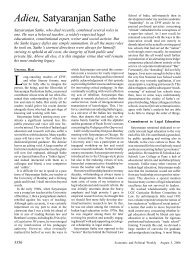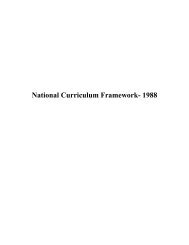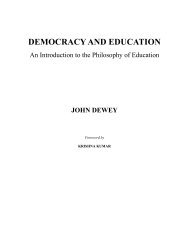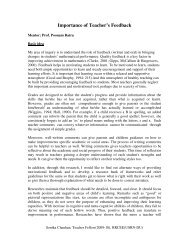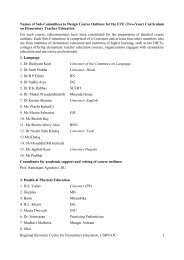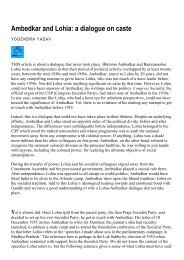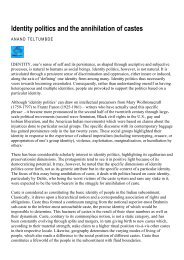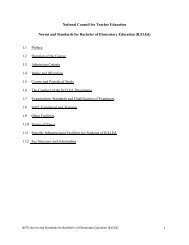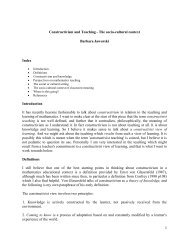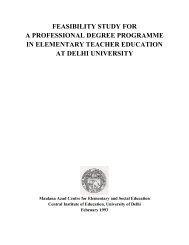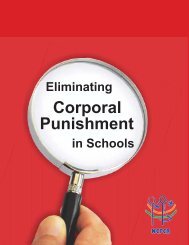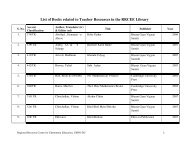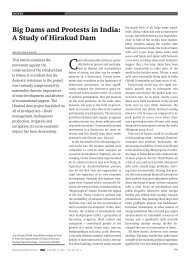Minority Rights in Education - eledu.net
Minority Rights in Education - eledu.net
Minority Rights in Education - eledu.net
Create successful ePaper yourself
Turn your PDF publications into a flip-book with our unique Google optimized e-Paper software.
nation. This need was felt <strong>in</strong> the context of the heightenedm<strong>in</strong>ority-majority awareness <strong>in</strong> the British period. The divide andrule policy of the British had alienated m<strong>in</strong>orities. In addition,the identification of the Congress with the H<strong>in</strong>du upper castesby a dom<strong>in</strong>ant stratum of the m<strong>in</strong>ority furthered the fear ofsubjugation <strong>in</strong> post-<strong>in</strong>dependence India among the same. In thesecircumstances, constitutional guarantee of rights was consideredan effective means to dispel the fear and to conv<strong>in</strong>ce the m<strong>in</strong>oritiesof protection of their <strong>in</strong>terests <strong>in</strong> the <strong>in</strong>dependent India.However, Partition and the assass<strong>in</strong>ation of Mahatma Gandhiwere two mov<strong>in</strong>g forces that resulted <strong>in</strong> conf<strong>in</strong><strong>in</strong>g the rights ofthe m<strong>in</strong>orities, especially the religious m<strong>in</strong>orities, to socio-culturalfields like education and language.As has been mentioned earlier, the rights promised <strong>in</strong> the Constitutionare b<strong>in</strong>d<strong>in</strong>g on the state and even the legislative assemblycannot modify these rights. Further, <strong>in</strong>trusion of any nature onthese rights can be challenged <strong>in</strong> the court. However, the word<strong>in</strong>gof Article 30 were kept vague, leav<strong>in</strong>g much to the <strong>in</strong>terpretationof the judiciary, giv<strong>in</strong>g space to accommodate changes <strong>in</strong> thepolitical and value structures. To quote Yaq<strong>in</strong> (1986:45),While Article 23 of the Draft Constitution, correspond<strong>in</strong>g to thepresent Article 30, was be<strong>in</strong>g debated, doubts were <strong>in</strong>deed expressed<strong>in</strong> the Constituent Assembly over the advisability ofleav<strong>in</strong>g vague justifiable rights to undef<strong>in</strong>ed m<strong>in</strong>orities. The assemblychose to avoid any further elaboration and left it to the wisdomof the courts to supply this omission.A look at the court cases reveals regular and frequent <strong>in</strong>terpretationof these rights <strong>in</strong> both, the high court and the SupremeCourt. A few relevant <strong>in</strong>terpretations def<strong>in</strong><strong>in</strong>g implications ofthe Article 30, are discussed <strong>in</strong> the follow<strong>in</strong>g sections of the paper.Concept of <strong>M<strong>in</strong>ority</strong>‘<strong>M<strong>in</strong>ority</strong>’ as a concept has not been adequately def<strong>in</strong>ed <strong>in</strong>the Indian Constitution. Although mention<strong>in</strong>g the culturalattributes of religion and language, the Constitution does notprovide details on the geographical and numerical specificationof the concept. Even the specifics of language and religion arenot mentioned. In the constituent assembly debate on Article 23,B R Ambedkar (Constituent Assembly Debates, 1948-49:922-923) said,It will be noted that the term m<strong>in</strong>ority was used there<strong>in</strong> not <strong>in</strong>the technical sense of the word ‘m<strong>in</strong>ority’ as we have beenaccustomed to use it for the purposes of certa<strong>in</strong> political safeguards,such as representation <strong>in</strong> the Legislature, representation <strong>in</strong> theServices and so on. The word is used not merely to <strong>in</strong>dicate them<strong>in</strong>ority <strong>in</strong> the technical sense of the word, it is also used to coverm<strong>in</strong>orities which are not m<strong>in</strong>orities <strong>in</strong> the technical sense, butwhich are no<strong>net</strong>heless m<strong>in</strong>orities <strong>in</strong> the cultural and l<strong>in</strong>guisticsense. For <strong>in</strong>stance, for the purposes of this Article 23, if a certa<strong>in</strong>number of people from Madras came and settled <strong>in</strong> Bombay forcerta<strong>in</strong> purposes, they would be, although not a m<strong>in</strong>ority <strong>in</strong> thetechnical sense, cultural m<strong>in</strong>orities.... The article <strong>in</strong>tends to giveprotection <strong>in</strong> the matter of culture, language and script not onlyto a m<strong>in</strong>ority technically, but also to a m<strong>in</strong>ority <strong>in</strong> the wider senseof the terms as I have expla<strong>in</strong>ed just now.As early as 1958, <strong>in</strong> ‘In Re the Kerala <strong>Education</strong> Bill, 1957’(AIR 1958 SC 956) the Supreme Court suggested the techniqueof arithmetical tabulation of less than 50 per cent of populationfor identify<strong>in</strong>g a m<strong>in</strong>ority. This population was to be determ<strong>in</strong>ed<strong>in</strong> accordance to the applicability of the law <strong>in</strong> question. If anAct is applicable nationwide then the m<strong>in</strong>ority group would bedecided on the national figures and <strong>in</strong> the case of the Act be<strong>in</strong>gapplicable <strong>in</strong> a state, the m<strong>in</strong>ority group would be decided onthe state figures. However, the recent case of T M A Pai Foundationand Ors vs State of Karnataka and Ors (October 2002;now onwards Pai case) has specified the geographical entity ofstate for consideration of the status of m<strong>in</strong>ority for Article 30.To quote from the judgment (Judgments Today, 2002(9) SC 2)S<strong>in</strong>ce reorganisation of the states <strong>in</strong> India has been on l<strong>in</strong>guisticl<strong>in</strong>es, therefore, for the purpose of determ<strong>in</strong><strong>in</strong>g the m<strong>in</strong>ority, theunit will be the state and not the whole of India. Thus, religiousand l<strong>in</strong>guistic m<strong>in</strong>orities, who have been put at par <strong>in</strong> Article 30,have to be considered statewise.One fails to understand how organisation of states on l<strong>in</strong>guisticbasis provides a base for consideration of the states as the basicunit for arithmetical calculation for determ<strong>in</strong><strong>in</strong>g religious m<strong>in</strong>orities.Further, it is important to mention that the condition ofhav<strong>in</strong>g less than 50 per cent of the population <strong>in</strong> a state, dist<strong>in</strong>guishableon religious or l<strong>in</strong>guistic terms, does not entitle o<strong>net</strong>o the rights automatically. In the words of Ambedkar (ConstituentAssembly Debates, 1948-49: 923),I th<strong>in</strong>k another th<strong>in</strong>g which has to be borne <strong>in</strong> m<strong>in</strong>d <strong>in</strong> read<strong>in</strong>garticle 23 is that it does not impose any obligation or burden uponthe State. It does not say that, when for <strong>in</strong>stance the Madras peoplecome to Bombay, the Bombay government shall be required bylaw to f<strong>in</strong>ance any project of giv<strong>in</strong>g education either <strong>in</strong> Tamillanguage or <strong>in</strong> Andhra language or any other language...The onlylimitation that is imposed by article 23 is that if there is a culturalm<strong>in</strong>ority which wants to preserve its language, its script and itsculture, the State shall not by law impose upon it any other culturewhich may be either local or otherwise. Therefore this article reallyis to be read <strong>in</strong> a much wider sense and does not apply only towhat I call the technical m<strong>in</strong>orities as we use it <strong>in</strong> our Constitution.Succ<strong>in</strong>ctly, it is left to the m<strong>in</strong>ority to establish its m<strong>in</strong>oritystatus <strong>in</strong> order to avail the benefits of the Article 30. The taskis difficult especially because the concepts of ‘religion’ and‘language’ have not been adequately def<strong>in</strong>ed <strong>in</strong> the article or theconstituent assembly debates. Does the concept of language referto the languages hav<strong>in</strong>g adequately developed grammar and scriptor only script is sufficient to claim the status or is spoken languagea condition enough to acquire the status of m<strong>in</strong>ority?As far as language is concerned, the case of D A V College,Jullunder vs State of Punjab (AIR 1971 SC 1737) is consideredimportant. In this case, the Court observed,A l<strong>in</strong>guistic m<strong>in</strong>ority for the purpose of Article 30(1) is one whichmust at least have a separate spoken language. It is not necessarythat that language should also have a dist<strong>in</strong>ct script for those whospeak it.As far as the concept of religion is concerned, can a sect claimthe status of m<strong>in</strong>ority? Does the Article accept only major wellrecognised religions or emerg<strong>in</strong>g religions can also avail of thebenefits? In the latter case, how can it be established that thereligion is new and is not merely a sect?A study of court cases reveals a cont<strong>in</strong>uous struggle betweenthe State and m<strong>in</strong>orities on these issues. For <strong>in</strong>stance, Patna HighCourt announced Arya Samaj [Arya Prat<strong>in</strong>idhi Sabha vs Stateof Bihar (AIR 1958, Patna 359)], a m<strong>in</strong>ority dist<strong>in</strong>ct from theH<strong>in</strong>dus. However, <strong>in</strong> 1976, Delhi High Court decided aga<strong>in</strong>stprovid<strong>in</strong>g benefits of Article 30 to denom<strong>in</strong>ations and sects. Toquote Desai (1996:34)The most significant case on this issue was decided by the DelhiHigh Court <strong>in</strong> 1976…It lays down the correct position <strong>in</strong> law namelyEconomic and Political Weekly June 11, 2005 2431



